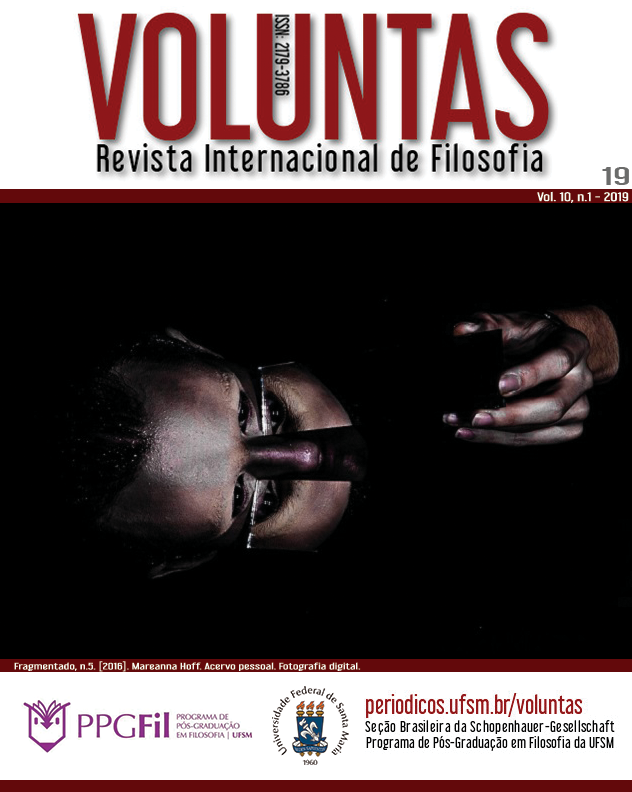The role of the body in Schopenhauer’s ethical thought
DOI:
https://doi.org/10.5902/2179378636652Keywords:
Body, Ethics, WillAbstract
This paper aims at demonstrating the body’s fundamental participation in Schopenhauer’s Ethics. When one takes as a starting point the world as representation, the body is the objectivation of the Will, its most immediate way of manifesting itself in the world. But, on the other hand, if one analyzes the world on the Will’s perspective, the body is the Will itself, lived and experienced by means of the very own motives that rule this desiring object. By postulating the Will, one and non-perishable, as the ultimate ground of reality – as Schopenhauer does – there is no way to neglect the body and human suffering. And this is not without consequences for Ethics. According to the philosopher, Ethics lies neither in good intentions nor in the search for some spiritual or transcendent good, but it exists concretely in individuals’ efective actions, that are driven to other individuals – perceived, before anything else, as suffering bodies.Downloads
References
ARISTÓTELES. Ética a Nicômaco. Trad. Antônio de Castro Caeiro. São Paulo: Atlas, 2009.
BARBOSA, Melissa. Schopenhauer e o corpo. La Salle, vol. 8, no. 1, p. 31-54, 2003.
DEBONA, Vilmar. Schopenhauer e as formas da razão: o teórico, o prático e o ético-místico. São Paulo: Annablume, 2010.
JANAWAY, Christopher. The Cambridge Companion to Schopenhauer. Cambridge: University Press, 1999.
MARTINS, Eduardo. “Freud e Schopenhauer: os limites de um diálogo sobre a moral”. São Carlos: Centro de Educação em Ciências Humanas. Dissertação de Mestrado em Filosofia. UFSCar, 2006.
MENDONÇA, Marinella Morgana. “As incidências da repetição no corpo, pela via da dor”. Belo Horizonte: Faculdade de Filosofia e Ciências Humanas. Dissertação de Mestrado em Psicologia. UFMG, 2006.
MENDONÇA, Marinella Morgana. “A dimensão ética do corpo nos pensamentos de Schopenhauer e de Freud”. Belo Horizonte: Faculdade de Filosofia e Ciências Humanas. Tese de Doutorado em Filosofia. UFMG, 2015.
PALAO, Antonio. La sabiduria budista del vacío. In: URDANIBIA, Javier. (Coord.) Los Antihegelianos: Kierkgaard y Schopenhauer. Barcelona: Anthropos, 1990.
ROCHA, Zeferino. A experiência psicanalítica: seus desafios e vicissitudes, hoje e amanhã. Ágora, Rio de Janeiro, 2008, vol. XI, n.1 Jan/Jun, 101-116.
SCHOPENHAUER, Arthur. Sobre o fundamento da moral. Trad. Maria Lucia Cacciola. São Paulo: Martins Fontes, 2001.
SCHOPENHAUER, Arthur. O mundo como vontade e como representação. Tomo I. Trad., apresentação, notas e índices Jair Barboza. São Paulo: UNESP, 2005.
SCHOPENHAUER, Arthur. Aforismos para a sabedoria de vida. Trad. Jair Barboza. São Paulo: Martins Fontes, 2006.
SCHOPENHAUER, Arthur. Sobre la libertad de la voluntad. Trad. Ángel Gabilondo. Madrid: Alianza, 2007.
SCHOPENHAUER, Arthur. Sobre a ética. (Capítulos 8 – 15 de Parerga e Paralipomena de Arthur Schopenhauer). Organização e tradução Flamarion Caldeira Ramos. São Paulo: Hedra, 2012.
SOARES, Daniel Quaresma Figueira. O gênio e o santo na filosofia de Schopenhauer. Revista Voluntas: Estudos sobre Schopenhauer, vol. 2, no.1, pp.83-94, 2011.
SORIA, Ana Carolina Soliva. Freud e o porto da filosofia de Schopenhauer. In: FONSECA, E.R.; MATTOS, F.C.; RAMOS, F.C.; HULSHOF, M.; DEBONA, V. (Org.) Dogmatismo e antidogmatismo: filosofia crítica, vontade e liberdade. Uma homenagem a Maria Lúcia Mello e Oliveira Cacciola. 1ª ed. Curitiba: Editora da UFPR, v.0, p.311-323, 2015.
Published
How to Cite
Issue
Section
License
The submission of original manuscripts to this journal implies the transference, by the authors, of the copyrights for printed and digital publication. The copyrights of a published manuscript belong ultimately to the author, and only the copyright for its first publication is reserved to the journal. Authors may only use the same results in other publications explicitly indicating this journal as the medium of the original publication.
Licence
Attribution-NonCommercial-ShareAlike 4.0 International (CC BY-NC-SA 4.0) - This license lets others remix, tweak, and build upon your work non-commercially, as long as they credit you and license their new creations under the identical terms.






